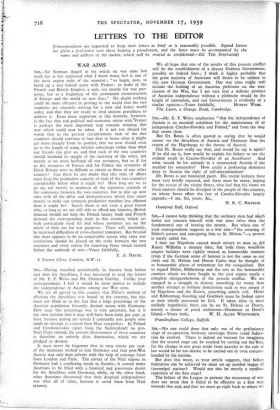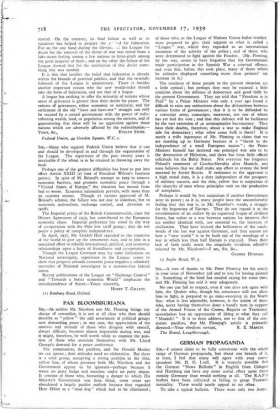LETTERS TO THE EDITOR
[Correspondents are requested to keep their letters as brief as is reasonably possible. Signed letters are given a preference over those bearing a pseudonym, and the latter must be accompanied by the name and address of the author, which will be treated as confidential.—Ed. THE SPECTATOR]
WAR AIMS
SIR,—Sir Norman Angell in his article on war aims last week has at last expressed what I know many feel is one of the most urgent tasks of the moment ; " to begin, now, to build up a real federal unity with France: to make of the French and British Empires a unit, not merely for war pur- poses, but as a beginning of the permanent reconstruction of Europe and the world on new lines." No doubt nothing could be more effective in proving to the world that the two countries are sincerely striving for a new and better world order, and that they are ready to shed ancient prejudices to achieve it. Even more important at this moment, however, is the fact that real political and economic union with4France is perhaps the most important step towards winning this war which could now be taken. Is it not too absurd for words that in the present circumstances each of the two countries should continue to buy dear at home what it might get more cheaply from its partner, that we now should even go to the length of using inferior substitutes rather than what our friends can give us, and that each of the two countries should husband its supply of the currency of the other, not merely as we must husband all our resources, but as if for us the resources of France and for France the resources of Great Britain were as difficult to obtain as those of-any other country? Can there be any doubt that this state of affairs must keep the productive capacity of each of the two countries considerably below what it might be? How long are we to go on, not merely to maintain all the expensive controls of the commerce between the two countries, but to pile up new ones with all the delay and disorganisation which they cause merely to make our common productive machine less efficient than it might be? Surely there is not even a good reason why, so long as we are still able to afford any luxuries, British demand should not help the French luxury trade and French demand the corresponding trade in this country, which are both particularly hard hit and whose resources are on the whole of little use for war purposes. There will, inevitably, be increased difficulties of cross-channel transport. But beyond this there appears to be no conceivable reason why extra war restrictions should be placed on the trade between the two countries and every reason for removing those which existed before the outbreak of war.—Yours faithfully, F. A. HAYEK. 8 Turner Close, London, N.W.
SIR,—Having travelled considerably in Austria both before and after the Anschluss, I was interested to read the letters of Mr. E. F. Weiss and Mr. Clement Gadsby. Unlike your correspondents, I feel it would be most unwise to indude the independence of Austria among our War aims.
We are all agreed in this country that Hitler's method of effecting the Anschluss was brutal in the extreme, but this must not blind us to the fact that a large percentage of the Austrian population fervently desired union with Germany. How large this percentage was is very uncertain, but it is my own opinion that it may well have been forty per cent. at least, because during my travels I constantly met people who made no attempt to conceal their Nazi sympathies. In Poland and Czechoslovakia (apart from the Sudetenland) no pro- Nazi Party existed; the present Government of these countries is therefore an entirely alien domination, which we are pledged to destroy.
It must never be forgotten that in. 1919 ninety per cent. of the Austrians wished to join Germany and that post-War Austria was only kept solvent with the help of constant loans from London and Paris. The advent of the Nazi -regime in- Germany had a conflicting result in Austria ; it caused many Austrians -to be filled with a fanatical and passionate desire for the Anschluss with Germany, while, on the other 'hand, other Austrians discovered that their despised independence was after all of value, because it saved them frOm Nazi tyranny.
We all hope that one of the results of this present conflict will be the establishment of a decent. German Government, possibly on federal lines ; I think it highly probable that the great majority of Austrians will desire to be subject to this new German Government. Our' war aims might well include the holding of an Austrian plebiscite on the con- clusion of the War, but I am sure that a definite promise of Austrian independence without a plebiscite would' be the height of unwisdom, and our Government is evidently of a
similar opinion.—Yours faithfully, HUBERT WEBB. The Lawn, 2 Grange Road, Cambridge.
SIR,—Mr. E. F. Weiss emphasises "that the independence of Austria is an essential condition for the maintenance of . an independent Czecho-Slovakia and Poland," and • from the map that seems clear.
But Dr. Benes is often quoted as saying that he would sooner see the Anschluss of Austria and Germany than the return of the Hapsburgs to the throne of Austria.
Did Dr. Benes really say that, and would he say it again? If he did say it, how would he explain his failure to see the evident result to Czecho-Slovakia of an Anschluss? And what would be his attitude to a resurrected Austria if -,.she recalled the monarchy? How could a professing democrat deny to Austria the right of self-determination?
Dr. Benes is our honoured guest. His recent lectures have been very briefly reported, and there must be many, hoping for the rescue of the victim States, who feel that his views on these matters should be divulged to the people of this country, on whose brave effort the fate of Czecho-Slovakia largely depends.—I am, Sir, yours, &c., Sta,—I cannot help thinking that the ordinary man had flinch better not concern himself with war aims other than the fundamental one of beating the enemy., But when one of your correspondents suggests as a war aim—" the securing of Hitler's person and consigning him to St. Helena "—a protest is surely called for.
I dare say Napoleon caused, much misery to men ast did Kaiser Wilhelm a century later, but both these would-be empire builders were rightly treated as honourable enemies (even if the German sense of honour is not the same as our own) and St. Helena and Doorn Castle may be thought of as honourable places of retirement for the vanquished. But to regard Hitler, Ribbentrop and the rest as the honourable enemies whom we have fought in the past argues surely a complete misapprehension of the present conflict. We ,are engaged- in a struggle to destroy something far worse than another attempt at military domination such. as was aimed at by Napoleon and the Kaiser, something utterly evil. Hitler and Ribbentrop, Goering and Goebbels must be looked upon as men wholly possessed by Evil. If taken alive (a most unlikely hypothesis) there can be no St. Helena or Doorn, merely a choice of penal settlement—Dartmoor or Devil's
Framlingham College, Suffolk.
Snt,—No one' could deny that only out of the -preliminary stage of co-operation between sovereign States could federa- tion be evolved. There is indeed no warrant for imagining that the second stage can be-reached by cutting out ,therfirst, for the change in one great stride from anarchy to the rule of law would be far too drastic to be carried out or even compre- hended by the nations.
But does this mean, as your article suggests, that before federation can be achieved we must set up another league of (sovereign) nations? WOuld not this be merely a needless repetition of the first stage? •
The:failure Of 'the League to prevent the recurrence of war does not mean that it failed to be effective as a first step towards that end, and that we must go right back to where we started. On the contrary, its final failure as well as its successes has helped to prepare the g Ind for federation. For on the one hand during the life-tim.: ci the League the desire for the removal of the threat of war was raised from a luke-warm feeling among a few nations to fever-pitch among the great majority of them ; and on the other the failure of the League showed that for the satisfaction of this desire some- thing else was needed.
It is this that justifies the belief that federation is already within the bounds of practical politics, and that the re-estab- lishment of the League is unnecessary. There is besides another important reason why the new world-order should take the form of federation, and not that of a league.
A league has nothing to offer the minority of nations whose sense of grievance is greater than their desire for peace. The redress of grievances, either economic or territorial, and the settlement of the old " have and have-not " struggle can only be secured by a central government with the power of redis- tributing wealth, land, or population among the nations, and of guaranteeing that there will be no aggression against those nations which are adversely affected by the redistribution.— Federal Union, 44 Gordon Square. W.C. z.
Slit,—Many who support Federal Union believe that it can and should be developed in and through the organisation of the League. The experience of the past twenty years is invaluable if the wheat is to be retained in throwing away the husk.
Perhaps one of the greatest difficulties has been to put into effect Article XXIII (e) (one of President Wilson's fourteen points). In spite of M. Briand's attempt in 1929 to remove economic barriers, and promote economic peace through a " United States of Europe," the situation has moved from bad to worse. Economic nationalism prevails, with more than 2o customs unions. Though 27 nations approved of M. Briand's scheme, the failure was not due to inanition, but to economic nationalism, exchange control, and devotion to tariffs.
The Imperial policy of the British Commonwealth, since the Ottawa Agreement of 1932, has contributed to the European economic chaos. Imperial preference has stood in the way of co-operation with the Oslo low tariff group ; they do not prefer a policy of complete independence.
In April, 1937, Mr. Cordell Hull appealed to the countries of the world to give up the armaments race, and to join in a concerted effort to rebuild international, political, and economic relationships upon a basis of friendliness and co-operation.
Though the League Covenant may lay some limitations on National sovereignty, experience in the League seems to show that progress towards economic peace requires a voluntary surrender of National sovereignty in a customs-free federal union.
Recent publications of the League on " Exchange Control " and " Towards a better economic World " emphasise the interdependence of States.—Yours sincerely,





































































 Previous page
Previous page